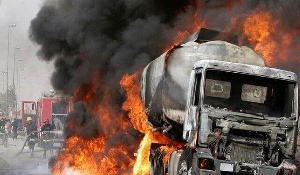Stakeholders in the downstream petroleum sector are hoping that recent gas explosions in the sector that has claimed many lives and destruction of millions of properties are going to be a thing of the past.
This is because of a number reforms that has been introduced into the sector following the Atomic Junction on October 7, 2017.
It was exactly a year ago on Sunday, October 7, 2018 when the Atomic Junction gas explosion occurred.
Seven people lost their lives while 135 people also sustained varying degree of injuries.
Speaking in an interview with Mr Gabriel Kumi, who is the Vice Chairman of the LPG Marketing Companies, to seek his thoughts on how the industry is faring one year on after the Atomic Junction gas explosion, and, moreover, whether the safety measures the NPA had directed their members to institute had brought any difference in their operations.
He admitted that there has been a significant improvement in safety measures, as well as how LPG is discharged at the LPG stations.
"In the past, what we did was that we kept the engines of the LPG trucks on while the LPG was being discharged into our storage tanks. But, we realized that it was one of contributory factors as far as explosions at the stations are concerned, because when the truck keeps the engine on, it generates heat and the whole atmosphere becomes charged and so when there is a little spark, it could trigger explosion.
"So what we have decided is that we have procured an independent electronic discharge pump, which we connect to the hose of the pump to the car and then put off the engine of the truck and the discharging is done safely," he explained.
According to him, between 70% and 80% of their members have, so far, procured the electronic discharging pumps.
Apart from that, Gabriel Kumi said their members are now more safety conscious, stressing that "we have improved on safety measures one year on after the incident."
He was hopeful that given the level of safety consciousness of LPG operators, there wouldn't be any gas explosion at fuel filling stations anymore.
Meanwhile, Chief Programmes Officer at the Environmental Protection (EPA) William Hayfron Acquah, has also explained that his outfit has introduced a number of measures to deal with gas explosion, following the Atomic Junction gas incident.
He said, apart from intensifying their monitoring role, they have gone a step further to train pump attendants, line managers and operation managers of the LPG filling stations.
He said the Agency noted that most of the pump attendants lacked knowledge and skills about the work they do, stressing that "this is the reason why the Atomic Junction gas explosion occurred."
According to him, the training is expected to cover about 24,000 people across the country.
Business News of Thursday, 1 November 2018
Source: Michael Creg Afful













